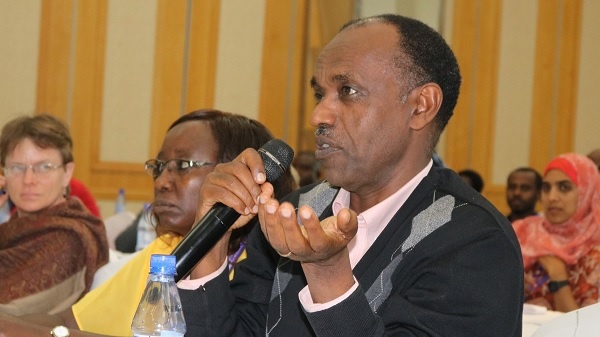
(Harvard T.H. Chan School of Public Health) – When Atalay Alem began working as a medical doctor in Ethiopia in the early 1980s, there were only a handful of psychiatrists in the whole country, and very few were interested in research.
Atalay* went on to work at Ethiopia’s only psychiatric hospital, then earned a degree in psychiatry. Thanks in part to his efforts over the past three decades, mental health services and research in Ethiopia have grown significantly.
For his lifelong contributions to the field of mental health in his home country and worldwide, Atalay, a professor of psychiatry at Addis Ababa University, was honored with the annual Harvard Award in Psychiatric Epidemiology and Biostatistics. Karestan Koenen, professor of psychiatric epidemiology, presented the award at Harvard T.H. Chan School of Public Health on September 10, 2019.
In an introduction, Atalay’s longtime colleague, epidemiologist Derege Kebede, SM ’87, SD ’95, said that Ethiopia now has more than 85 psychiatrists and 400 psychiatric nurses, and psychiatric services are offered in most hospitals. In addition, there are now hundreds of research studies published about mental health in Africa. Kebede credited Alem’s “leadership and relentless efforts” for helping bring about these changes.
Atalay then spoke and told the audience that a major focus of his research has been the epidemiology of mental disorders among rural and urban populations, displaced people, children, and women of reproductive age. He noted that he was principal and co-investigator of the Butijara Course and Outcome Study of Major Mental Disorders, a large long-term study that looked at the prevalence and nature of severe mental disorders in rural Ethiopia and aimed to better predict the course of these disorders and improve treatment.
Professor Atalay Alem also spearheaded the creation of a graduate program in psychiatry at Addis Ababa University and established research collaborations with institutions around the world.
He said that the wealth of population data available in African nations and in other low-income countries can help researchers everywhere learn more about the prevalence and nature of mental disorders.
“There is a great opportunity in low-income countries for research—very large populations, genetic diversity, geographic diversity, and sociocultural diversity,” Atalay Alem said. Such research, he added, could be used “to better understand humanity and improve people’s lives.”
* Ethiopians use patronymic names rather than family names. That is, a person in Ethiopia is addressed by his/her given name as there is no such thing as ‘family name’ or ‘inherited name.’
